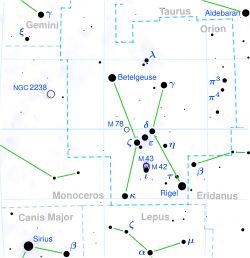GJ 3379
 ウィキペディアから無料の百科事典
ウィキペディアから無料の百科事典
| GJ 3379 | ||
|---|---|---|
| 星座 | オリオン座 | |
| 見かけの等級 (mv) | 11.33[1] | |
| 位置 元期:J2000.0 | ||
| 赤経 (RA, α) | 06h 00m 03.5038608130s[2] | |
| 赤緯 (Dec, δ) | +02° 42′ 23.596778811″[2] | |
| 視線速度 (Rv) | 30.228 km/s[2] | |
| 固有運動 (μ) | 赤経: 309.487 ミリ秒/年[2] 赤緯: -40.640 ミリ秒/年[2] | |
| 年周視差 (π) | 192.0675 ± 0.0715ミリ秒[2] (誤差0%) | |
| 距離 | 16.981 ± 0.006 光年[注 1] (5.207 ± 0.002 パーセク[注 1]) | |
| 絶対等級 (MV) | 12.7[注 2] | |
GJ 3379の位置(丸印) | ||
| 物理的性質 | ||
| 半径 | 0.245 R☉[3] | |
| 質量 | 0.227 M☉[3] | |
| 自転速度 | 6.9 km/s[3] | |
| 自転周期 | 1.809 日[3] | |
| スペクトル分類 | M4 V[4] | |
| 光度 | 0.006 L☉[5] | |
| 表面温度 | 3,178 ± 41 K[6] | |
| 色指数 (B-V) | 1.68[1] | |
| 色指数 (U-B) | 1.10[1] | |
| 金属量[Fe/H] | 0.08 ± 0.17[6] | |
| 他のカタログでの名称 | ||
| G 99-49, Karmn J06000+027, LSPM J0600+0242, 2MASS J06000351+0242236, TYC 134-605-1[2] | ||
| ■Template (■ノート ■解説) ■Project | ||
GJ 3379或いはG 99-49は、オリオン座にある恒星である。かつては太陽系に非常に近い位置にいたことがある[7]。
特徴[編集]
| 太陽 | GJ 3379 |
|---|---|
 |
GJ 3379は、太陽のごく近傍に存在する恒星の一つで、年周視差を基に計算した太陽からの距離は約17光年である[4][2]。GJ 3379の見かけの等級は11.3で、肉眼で見える明るさではなく、その距離から絶対等級は12.7と見積もられる[1][注 2]。スペクトル型はM4 Vと分類される活動的な赤色矮星で、有意なX線、極端紫外線が検出されることから、閃光星に分類されることもある[4][8][9]。半径や質量は、太陽の2割から4分の1程度の小さい恒星で、有効温度はおよそ3,200K、光度は太陽の0.6%に過ぎない[3][6][5]。M型主系列星は、主系列星の中では強い磁場を生成すると考えられており、GJ 3379も平均的な磁場の強さは2.5kGと見積もられている[10]。
GJ 3379は、視線速度30km/sで太陽から遠ざかっており、現在でもかなり太陽系に近いが、過去にはもっと近い位置にあった[2][7]。およそ16万年前には、太陽からの距離がわずか4.3光年の位置を通過したと推定されている[7]。
脚注[編集]
注釈[編集]
出典[編集]
- ^ a b c d van Altena, W. F.; Lee, J. T.; Hoffleit, E. D. (2001-08), “Yale Trigonometric Parallaxes, Fourth Edition”, VizieR On-line Data Catalog: I/238A, Bibcode: 2001yCat.1238....0V
- ^ a b c d e f g h i “G 99-49 -- Eruptive variable Star”. SIMBAD. CDS. 2021年2月12日閲覧。
- ^ a b c d e Newton, Elisabeth R.; et al. (2016-04), “The Rotation and Galactic Kinematics of Mid M Dwarfs in the Solar Neighborhood”, Astrophysical Journal 821 (2): 93, arXiv:1511.00957, Bibcode: 2016ApJ...821...93N, doi:10.3847/0004-637X/821/2/93, ISSN 1538-4357
- ^ a b c Reid, I. Neill; Hawley, Suzanne L.; Gizis, John E. (1995-10), “The Palomar/MSU Nearby-Star Spectroscopic Survey. I. The Northern M Dwarfs -Bandstrengths and Kinematics”, Astronomical Journal 110 (4): 1838-1859, Bibcode: 1995AJ....110.1838R, doi:10.1086/117655, ISSN 00046256
- ^ a b Newton, Elisabeth R.; et al. (2015-02), “An Empirical Calibration to Estimate Cool Dwarf Fundamental Parameters from H-band Spectra”, Astrophysical Journal 800 (2): 85, arXiv:1412.2758, Bibcode: 2015ApJ...800...85N, doi:10.1088/0004-637X/800/2/85, ISSN 1538-4357
- ^ a b c Rojas-Ayala, Bárbara; et al. (2012-04), “Metallicity and Temperature Indicators in M Dwarf K-band Spectra: Testing New and Updated Calibrations with Observations of 133 Solar Neighborhood M Dwarfs”, Astrophysical Journal 748 (2): 93, arXiv:1112.4567, Bibcode: 2012ApJ...748...93R, doi:10.1088/0004-637X/748/2/93, ISSN 0004-637X
- ^ a b c Bobylev, V. V. (2010-11), “Stars outside the Hipparcos list closely encountering the Solar system”, Astronomy Letters 36 (11): 816-822, arXiv:1009.4856, Bibcode: 2010AstL...36..816B, doi:10.1134/S1063773710110071, ISSN 1063-7737
- ^ Zechmeister, M.; et al. (2018-01), “Spectrum radial velocity analyser (SERVAL). High-precision radial velocities and two alternative spectral indicators”, Astronomy & Astrophysics 609: A12, arXiv:1710.10114, Bibcode: 2018A&A...609A..12Z, doi:10.1051/0004-6361/201731483, ISSN 0004-6361
- ^ Gershberg, R. E.; et al. (1999-11), “Catalogue and bibliography of the UV Cet-type flare stars and related objects in the solar vicinity”, Astronomy & Astrophysics Supplement Series 135: 555-558, Bibcode: 1999A&AS..139..555G, doi:10.1051/aas:1999407, ISSN 0365-0138
- ^ Shulyak, D.; et al. (2019-06), “Magnetic fields in M dwarfs from the CARMENES survey”, Astronomy & Astrophysics 626: A86, arXiv:1904.12762, Bibcode: 2019A&A...626A..86S, doi:10.1051/0004-6361/201935315, ISSN 0004-6361
